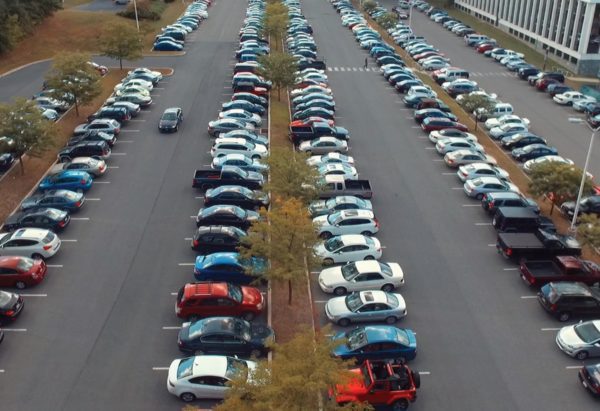

Photo Credit / Lance Soodeen
Richard MacTough
News Editor
University continue to be voice their dissatisfaction with parking on campus.
With the construction of a new residential suite to fix the over-crowded residence halls, parking spaces have been temporarily discontinued.
Kenneth Long, Vice President of Administration and Finance, hopes to resolve the problem. “We need to educate students on where and not to find parking,” said Long.
Commuters seem to be likely to park behind Dansbury Commons as the day starts. The common practice is for students to look for parking closer to their classes rather than walking further.
It is argued to be a main factor in parking difficulty at school. Parking lots, such as the one behind Kemp Library, most of the time remain around 75 percent vacant.
The library is further away from classes and is less common for students to want to park in an area further away from their courses.
Long discussed that a parking committee made of Residential, Commuter Students and Faculty is in place.
They make suggestions, bring the problems to public relations attention and put their own input of the situation. He also discussed Shuttle services on campus.
Each semester, students pay tuition for Shuttles, a service that drives students around campus, the University Ridge and in town.
Officer Blank encourages students to find a spot further away from class and using the shuttle to designate to class. They avoid walking as far and the worry about being late to school.
Consumers of many Universities suggest to build more parking spaces closer to academic buildings.
The problem is building more spaces means that buildings have to be moved. There is around six months to a year of construction that closes more spaces.
When parking is complete, new buildings have to be remade somewhere further from the most popular parking spaces.
Technology comes in handy in the digital age of the modern era. Long suggests perhaps installing green and red lights around parking lots to indicate whether or not a space is vacant. It would save the students time and less stress of not making it in time for class.
Security Officer Robin Hartshorn drove around campus to give a better understanding of parking situations and some things students do not realize.
The first week, many students who live on campus for the first time do not realize where they are allowed to park. Some residential students will put their cars near their dorms which may be for commuters.
Commuters may take a residential space. Hartshorn suggests, “students should drive around campus the first week to see what is available, and where may seem to be the best area to park in.”
Resident students should be advised to park further from dorms when they don’t drive much in the week. The only time they go out is to have fun or run an errand like grocery shopping.
If commuters are worried about getting to class on time, there has to be an initiative to arrive earlier. It would be the same idea as a job. Any students who are not paying to park have to be ticketed and disciplined.
In order to have a better parking experience, many need to think like a community and decide where is best to park for them and fellow undergraduates as well.
The University needs to be more lenient and emphatic on understanding that their campus community should be a first priority. Students are being punished with tickets for not parking in a qualifying space.
Public Relations and the Finance Administration must keep in mind their consumers shouldn’t be over punished when staff fails to meet timely needs of creating a good parking system in a chaotic problem.
Suggestions are encouraged by Campus Police and Human Relations. Make the best of it.
Email Richard at:
rmactough@live.esu.edu
